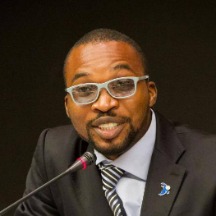Nigerians are expected to have run-off elections after going to the polls February 25 to elect a new president and vice president, senators, and representatives says Olaiya Temitope Templer, News Editor at The Guardian Newspapers, Nigeria, on POH Podcast.
“There has never been a runoff to date,” Templer explains. However, with more than two front runners in this election, pundits think it will be difficult for one person to meet the country’s requirements to win.
To be elected in the first round, a candidate must receive a majority of the vote and over 25% of the vote in at least 24 of the 36 states. If no candidate passes this threshold, a second round is held between the top candidate and the next candidate who received a plurality of votes in the highest number of states.
Templer explains that with the new system the “fidelity of the process is high,” and that “there is high expectation that each vote will count.”
In the POH podcast, the News Editor of one of Nigeria’s most respected newspapers also expressed hope that the West African nation would not follow the democracies of the United States and Brazil and experience an attempted coup. “I feel the military is quit engaged with Boko Harem and Isis. They are really stretched to stage a coup,” he says.
Nigeria, which has the largest economy in Africa, has experienced 24 years of unbroken democracy after three short attempts. The fourth republic, says Templer, “has been the longest.”
Olaiya Temitope Templer, News Editor at The Guardian Newspapers, Nigeria - Nigerian Elections

One of the historical divisions in Nigerian politics is between the North and the South. For some background thought, in 1914, Southern Nigeria was joined with the Northern Nigeria Protectorate to form the single British colony of Nigeria. Today, there seems to be an informal zoning agreement with northerners and southerners taking turns being president.
The four leading candidates for President equally represent the North and the South. The outgoing President, Muhammadu Buhari, is from the North. His party did select a southerner as its 2023 candidate, Bola Tinubu.
Peter Obi is often seen as the wildcard in the race as he presents himself as “a wave of change and a change of freshness,” added Templer. Reports say that he has excited the young and 70 percent of Nigerians are under the age of 30. The other candidates include Rabiu Kwankwaso and Atiku Abubakar. Some reports also include Kola Abiola as a leading candidate.
Noticeably absent are women and Templer thinks it will take a while for a woman to break that glass ceiling since “no state has produced a female governor,” he says. Also, only 7 of 80 senators were women in 2019.
However, Nigeria will take a step forward with The Independent National Electoral Commission (INEC) introducing a dedicated online portal, “INEC Result Viewing (IRV),” that will display results from polling units in real-time on election day.”
Templer explains that with the new system the “fidelity of the process is high,” and that “there is high expectation that each vote will count.”
Listen to the podcast: Olaiya Temitope Templer, News Editor at The Guardian Newspapers, Nigeria - Nigerian Elections
The four leading candidates for President equally represent the North and the South. The outgoing President, Muhammadu Buhari, is from the North. His party did select a southerner as its 2023 candidate, Bola Tinubu.
Peter Obi is often seen as the wildcard in the race as he presents himself as “a wave of change and a change of freshness,” added Templer. Reports say that he has excited the young and 70 percent of Nigerians are under the age of 30. The other candidates include Rabiu Kwankwaso and Atiku Abubakar. Some reports also include Kola Abiola as a leading candidate.
Noticeably absent are women and Templer thinks it will take a while for a woman to break that glass ceiling since “no state has produced a female governor,” he says. Also, only 7 of 80 senators were women in 2019.
However, Nigeria will take a step forward with The Independent National Electoral Commission (INEC) introducing a dedicated online portal, “INEC Result Viewing (IRV),” that will display results from polling units in real-time on election day.”
Templer explains that with the new system the “fidelity of the process is high,” and that “there is high expectation that each vote will count.”
Listen to the podcast: Olaiya Temitope Templer, News Editor at The Guardian Newspapers, Nigeria - Nigerian Elections
Advertisers | Contact Us | Events | Links | Media Kit | Our Company | Payments Pier
Press Room | Print Cover Stories Archives | Electronic Issues and Talk Radio Archives | Writer's Guidelines






